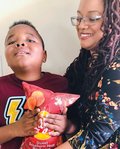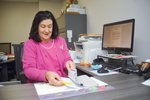


BYNUM — The Cannons are used to having to stay at home. But not like this.
For 16 years, Dale and Michelle Cannon have raised two children with autism — 17-year-old Joshua, who is adopted, and 16-year-old Shea, whose mother Michelle says has “pretty severe autism” and “functions at maybe like a 1-year old level.”
Normally, the Cannons have in-home help to take care of Joshua and Shea — they also have a 19-year-old son who, like his brothers, attends Northwood High School — when they’re not in school so the parents can work, but with the COVID-19 pandemic restricting movement, and Shea’s immuno-compromization, that help isn’t coming.
And it’s been really hard, they say, for Joshua.
“It’s not in his realm of understanding,” Dale said. “He understands getting a cold. He doesn’t understand how that same sort of thing, a virus, can make you go to the hospital or even kill you.”
The Cannons are just one family living in Chatham County facing an extra challenge during the COVID-19 pandemic — taking care of individuals with intellectual or developmental disabilities, I/DDs for short. This time has turned things upside down for both caretakers and those who they care for and love.
Missing what’s needed
Shawn Poe, the executive director of Chatham Trades, said she’s seen how the COVID-19 pandemic has “taken its toll on people,” but adds that pandemic is hitting the people she serves — Chatham Trades provides job and social skills training for individuals with I/DDs — much harder.
“The loneliness, isolation, possibly depression and fear — that is amplified in someone who is not able to comprehend and understand as much as other people,” Poe said. “The people we are working with, we’re working on elementary levels of functioning.”
Those who spoke to the News + Record for this story cited two major areas — socialization and routine — that the pandemic has upended. As Dale Cannon said of his son Joshua, those with I/DDs can often struggle to comprehend changes to routine and can struggle with it. Michelle said he has “really struggled.”
“He loves his Northwood friends and his community and his teachers and his aides,” she said. “He’s had some pretty serious (issues). It’s gotten pretty bad for him.”
Bad enough that they almost took him to the hospital with bipolar depression concerns.
“They both do very well with routine and this has been the biggest routine breaker ever,” Dale said of Joshua and Shea.
Poe said that applies to those with I/DDs on varying levels, usually by “the degree of their” disability.
“It is very important for someone with an intellectual or developmental disability to have a routine — from a time schedule where you sit on a van or in a car or at your work station,” she said. “Anytime that routine is changed, it could create confusion and could create behaviors. Someone that is functioning at a lower level needs repetition and routine in order to maintain their abilities to function.”
The socialization that has been lost in this time — for the Cannons’ kids attending school and the regulars at Chatham Trades in Siler City —is crucial for their development. Poe said those with I/DDs “become accustomed to their friends and their associations they’ve established.” While they can participate in Zoom meetings and phone calls, it’s not as easy as those who are neuro-typical.
“A lot of what we do is community-based,” she said, referring to what Chatham Trades does on a regular basis. “We can’t take somebody to Walmart when we’re picking up supplies to help them with that. We go out to do things in the public with groups, and groups typically go out to eat lunch once in a month in a restaurant. They learn about how to order from a menu, what’s available, what the seating is, what the restroom facilities are.”
The caretakers’ burden
Chatham Trades shut down operations after March 12, a day before Gov. Roy Cooper called off in-person public school classes for the time being. Poe said the organization surveyed all of its regular attendees and their guardians and families about coming in. Each said no.
So they’ve begun having regular phone contact with those they serve. Poe said it has been “very hard on the staff.”
“My direct care staff has developed long-term relationships with the people they serve” she said. “They’re concerned about, ‘What’s happening to my person? Are they getting what they need?’ Everybody that works here, I can say, works here because they love what they do, and they know they make a difference. It does hurt that they’re not here. I’m concerned for them too. A lot of my employees will tell you this is their life.”
Felicia Williams is a member engagement specialist with Cardinal Innovations Healthcare, which serves as Chatham’s public mental health agency and supports organizations like Daymark Recovery Services and Chatham Trades. Her 11-year-old son Kevin was diagnosed with autism at age 2 and has “limited verbal expression,” Williams said. She said this time has been “an interesting experience.”
“As a parent, of course you already have those feelings of inadequacy, especially when it comes to taking on the role of educating your child with special needs,” she said. “It’s not as simple as getting schoolwork and sitting down and your child working independently. A lot of their work is modified, so a lot of the techniques are modified and specialized.”
Williams said it boils down to having “at a minimum” five people at Kevin’s school providing assistance during the day to “just us,” her and her husband Brian, who is working from home during this time. She said she’s learned a lot about patience, self-care and purpose during the COVID-19 pandemic.
“Their way of learning their own unique challenges might not reflect your efforts,” she said. “Having to come to grips with that and give yourself a break as a parent — it really is a whole lot of introspective things going on but also trying to take note of happening outside of you and your family and trying to make sure you have your needs and keeping everybody safe, looking at what works for you.”
The Cannons usually send just one parent out at a time while the other stays home to look after the children. That’s already fairly isolating, they say, but the stay-at-home order and fear of passing the virus make that even more so.
“Friendships are hard to maintain, because you’re at home 24 hours a day trying to keep your kid alive, basically,” Michelle says. “And it’s very isolating. And then in a pandemic...”
“Everyone gets a sort of a taste of what we tend to feel like most of the time,” Dale continues, “and so that isolation or isolated feeling, it wasn’t a new thing for us. It was never this intense of course but that sense of being trapped in your house…”
“It’s like we’ve been under house arrest,” Michelle finishes.
Making it through
Chatham Trades, the Cannons and the Williamses have found ways to make it through during this time, or at the very least, have learned some things about human nature and reality.
The Williamses’ son Kevin loves Lays Sweet Southern Heat BBQ Flavored Potato Chips. Felicia said she thinks they’ve “totally wiped out this area” around their Orange County home, and family and friends have started shipping bags to their home. Kevin not getting those chips is something, like Joshua and the difference between a cold and a pandemic, he doesn’t understand.
“For my son — although these are chips and for us that’s not what we would consider a staple — it is a necessity,” Felicia says. “His meal each day consists of a bag of those chips, Pediasure, and he will do raw green vegetables. For him, ‘You have taken my meal away, and you’re my parent. Why aren’t you handling this?’ It’s been pretty intense at times.”
Poe said the families and caregivers of Chatham Trades’ clientele are using this time as an opportunity to continue to work on the skills taught at Chatham Trades.
“Their loved one being here allows them to continue to work and do the things they need to do,” Poe said. “It has given them some family time and allows them to work on some of the goals they’ve had here. I think it’s been beneficial for the caregiver and the consumer — stay active and continue to work on the routine things that they do here.”
The Cannons are manging their own music teaching business from their home while trying to keep their children on track academically (as much as possible) and maintain some kind of order. Dale says it’s made him appreciate the simple things.
“I think it really shows us how complicated our lives were and things are certainly a lot more simple now,” he said. “When, hopefully, we come out of this and things become closer to what we think is normal, I would like to extend some of that simplicity going forward.”
But for now, Williams encourages Chatham residents, and everyone else, to spare a thought for those working with loved ones with I/DDs.
“Every chance I get, I try to encourage others to share compassion instead of judgment,” she said. “That happens especially with people who don’t have that experience and understand it. What those people don’t realize is that as a caregiver, trying to create a therapeutic setting and an educational setting in your home, working from your role as a caregiver and a parent is not an experience that professionals are privy to. There’s a totally different dynamic when you bring it home and it’s coming through the role of caregiver.”
Reporter Zachary Horner can be reached at zhorner@chathamnr.com or on Twitter at @ZachHornerCNR.